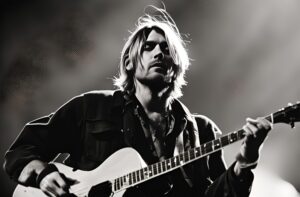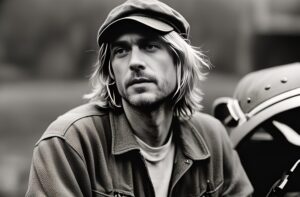
In a dimly lit Seattle club in 1994, Kurt Cobain, known as the king of grunge, stepped off stage, wiping away rivulets of sweat. Just moments before, he had yet again rendered an electrifying performance, leaving the audience hungering for more. While our reality sadly marks 1994 as the year of Cobain’s tragic demise, this alternate story imagines a different outcome – one where Cobain sought help for his inner battles, subsequently beginning a fresh chapter of his journey.
With time, Cobain’s artistic evolution took off impressively. By 1996, his band Nirvana released “Clearing the Clouds,” an album that significantly deviated from their original grunge roots. Marrying elements of psychedelic rock, folk, and orchestral arrangements, the album aptly personified Cobain’s maturing introspection and varied musical influences. Critics, although initially uncertain, eventually celebrated the masterpiece, arguing it reshaped the band’s legacy. Admirers too found comfort in the album’s raw, yet positive lyrics, which reflect Cobain’s continued struggle and ultimate triumph over his personal quests.

Across the late ’90s, Cobain’s refusal to comply with the music industry’s standard norms led to a surge in independent artists. Cobain’s candid discourse on mental health was instrumental in reducing the stigma associated with such conversations, providing relief to fans who joined him in sharing their struggles. Gradually, a shift occurred, with an increasing number of musicians and celebrities openly discussing their experiences with mental health.
Entering the early 2000s, Cobain ventured into the realm of visual arts, releasing a series of graphic novels encompassing themes of existentialism, identity, and human nature. His works were highly praised for their striking beauty and philosophical richness, further solidifying Cobain’s reputation as a versatile artist.
With the emergence of social media, Cobain leveraged these platforms to connect with fans and boost underground artists, establishing a mentorship role for many budding creatives. His online community grew, acting as a sanctuary for creative minds worldwide.
In 2010, Cobain announced a collaboration with David Bowie, resulting in the critically acclaimed album “Echoes of Mars.” It beautifully married Bowie’s avant-garde sound with Cobain’s raw emotion. The album’s exploration of humanity’s place in the universe and the search for meaning struck a chord with its audience, inspiring renewed interest in space exploration and scientific innovation.
Over the next decade, Cobain continued to break creative boundaries, experimenting with virtual reality and interactive art installations. His VR project, “Euphoria,” offered users an immersive journey into a mindscape shaped by his music and art. This innovative endeavor placed him as a pioneer in the realm of digital art, influencing a new generation of creators.
Cobain’s influence reached beyond music and arts—he tirelessly advocated for mental health, leading to the establishment of the “Nevermind Foundation.” This organization aimed to provide resources and support for those grappling with mental health issues, demonstrating that recovery and resilience were possible. Cobain’s journey served as a beacon of hope, and his foundation’s outreach initiatives significantly improved global mental health care access.

Cobain’s unwavering voice on social and environmental issues resonated deeply with activists. His support for initiatives aimed at tackling climate change, advocating for Indigenous rights, and promoting gender equality united diverse groups towards a shared purpose.
By 2023, Cobain celebrated his 56th birthday with a globally streamed concert. The event showcased the talents he cultivated over the years and served as a testament to his enduring legacy. Cheers and tributes poured in for a man whose openness, authenticity, and relentless pursuit of truth had touched countless lives.
Reflecting on Cobain’s trajectory, it’s evident that his influence reached well beyond music. Cobain emerged as a symbol of survival and transformation, displaying that even from the darkest depths of despair, one could rise.




